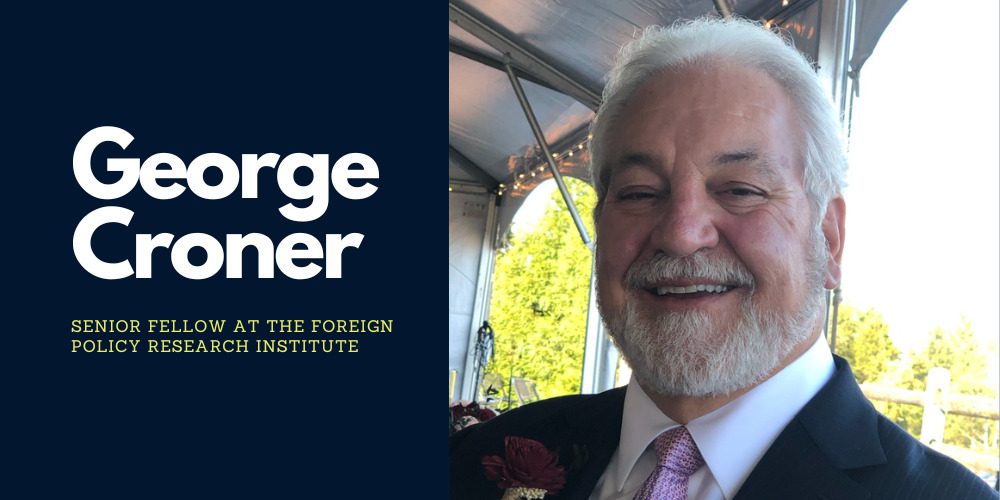After retiring from the private practice of law, George Croner began to give closer attention to national security issues and especially matters affecting the National Security Agency (NSA). In the 1980s, he worked in the Office of General Counsel at NSA, which he still considers the most interesting job he’s ever held.
Shortly after retiring, Mr. Croner became aware that Congress, in 2017, would be addressing the reauthorization of Section 702 of the Foreign Intelligence Surveillance Act (FISA). He shared the view of many in the intelligence field that the Section 702 program was the most important intelligence collection program operated by the U.S. government. He resolved to write a piece in support of its reauthorization.
George Croner’s efforts to have that piece published brought him to the Foreign Policy Research Institute (FPRI). FPRI not only agreed to publish his Section 702 article but also asked that he continue to write on the topic throughout the congressional reauthorization debate. Ultimately, Congress did reauthorize Section 702 and FPRI offered him the opportunity to continue commenting on national security matters as a Senior Fellow. Mr. Croner has been a Senior Fellow at FPRI since January 2018.
1. After you retired from legal practice, what inspired you to accept a position with the Foreign Policy Research Institute (FPRI)?
The particular issue that brought me to FPRI was the debate over the reauthorization of FISA Section 702 in 2017 and 2018. After Section 702 was reauthorized in January 2018, I felt compelled to continue writing on the numerous national security issues that interested me. Having been offered the opportunity to serve as a Senior Fellow at FPRI, I had an excellent platform to share articles and commentaries that I wrote, so it was a natural fit.
2. Please elaborate on your primary responsibilities for FPRI
I don’t have any “primary responsibilities” as such. Instead, FPRI offers me a forum to publish and discuss my writings on national security issues.
Over the past several years, I have had nearly 50 articles published by multiple platforms, including some of the most influential national security blogs in the country. My affiliation with FPRI has served as the springboard for these and other opportunities, such as an invitation to serve on the Advisory Council at the Center for Ethics and the Rule of Law (CERL) at the University of Pennsylvania.
3. What are some of the major U.S. foreign policy challenges currently at the forefront for you and FPRI?
FPRI has a broad and diverse roster of experts commenting on virtually all of the geopolitical tensions and challenges around the world — be it the war in Ukraine, tension between China and Taiwan, Middle East politics, or the nuclear ambitions of Iran and North Korea.
My area of expertise is foreign intelligence electronic surveillance, and particularly the Foreign Intelligence Surveillance Act (FISA). It might be a rather arcane niche to many, but my prior work at NSA whet my appetite on these issues and I have stayed interested for nearly 40 years now.
The next major FISA issue will involve the next reauthorization debate over FISA Section 702, which is currently due to expire at the end of December 2023. Ironically, the last reauthorization debate in 2017 represented my initial foray into writing on these issues. In a sense, I’ve come full circle.
4. We understand that you have extensive experience in national security law and intelligence collection matters. How do you see these issues changing and evolving over the next decade?
When I was at NSA in the mid-1980s, there was essentially a bipolar world dominated by the United States and the Soviet Union. With the collapse of the Soviet Union in the early 1990s and the growth of international terrorism, the U.S. faced a much more asymmetrical threat environment in a multipolar world. This brought an entirely new set of challenges in the first two decades of the 21st century, notably the 9/11 attacks and the wars in Iraq and Afghanistan.
Now that threat environment has morphed again in perhaps even more challenging ways. There is competition between the U.S. and China, which resembles the bipolar duel between the U.S. and the U.S.S.R. in the 45 years that followed World War II. But the international terrorism threat certainly hasn’t disappeared. Further complicating the global security landscape are various regional threats, such as Russia, Iran and North Korea.
The challenge of the next decade will be for the United States government to safely navigate through all of these international challenges amid a domestic political environment that is polarized to a degree that I have not seen in my lifetime.
5. You’ve had a long and storied career. Can you describe a few of the accomplishments you’re most proud of?
I’ve certainly had a long career. I’ll leave it to others to say whether it has been “storied” or not.
I did have a successful career in private practice that lasted nearly three decades. But I take particular pride in the fact that, when that career ended with my retirement in 2016, I parlayed my NSA experience and my continued interest in electronic surveillance into a second act. That’s something very few others in my field seem to have pursued.
Moreover, the opportunities afforded me by FPRI have allowed that second act to prosper in ways I never would have imagined. The affiliation I now have with CERL has been a welcome surprise, as has the fact that I’ve been published on a number of other major national security platforms since 2018. This has broadened my reputation in ways that I would not have imagined when I retired in 2016.
6. Do you have more information to share with our readers today?
I think I’ve covered most of what I would share with readers in my earlier responses. Thanks for the opportunity to share those viewpoints.





























